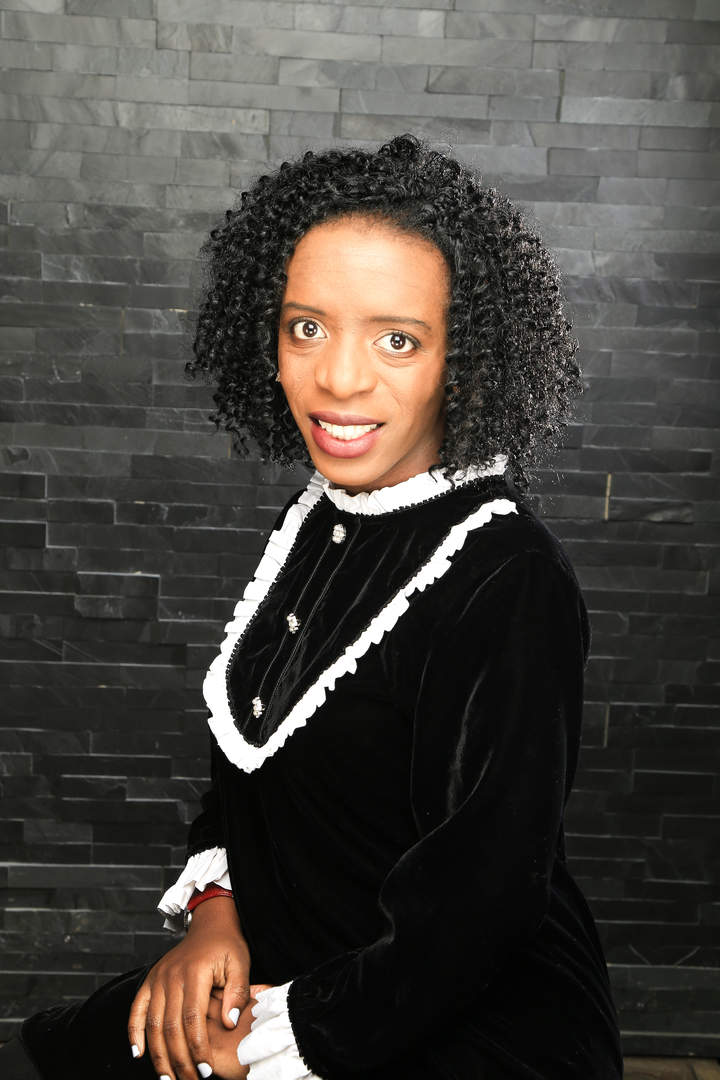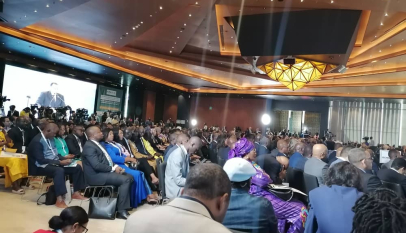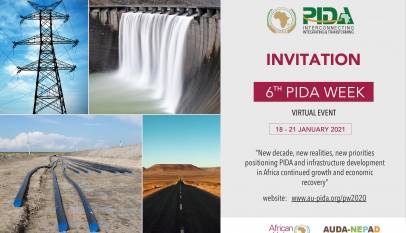INTERVIEW | There’s significant build-up towards more equal EU-Africa cooperation – Luckystar Miyandazi
Luckystar Miyandazi works as policy officer at the African Institutions and Regional Dynamics Programme of the European Centre for Development Policy Management (ECDPM) — an independent think tank that monitors and support development co-operation between the European Union and the African, Caribbean and Pacific (ACP) countries. She speaks about the changing dynamics in EU-Africa relations

Newspage: The 10th African Union (AU) – European Union (EU) Commission-to-Commission (C2C) meeting was held in Addis Ababa, Ethiopia, recently. What do you make of its outcome in terms of enhancing more equal EU-Africa relations?
Miyandazi: I think the 10th African Union (AU) – European Union (EU) Commission-to-Commission (C2C) meeting showed a new and more interest-driven partnership that is emerging between EU and AU. We saw for the first time, a record number of EU Commissioners (22 in total) accompanying the President of the European Commission Ursula von der Leyen to the AU. This high number of European Commission representation at the C2C, in my opinion, indicated the EU’s willingness to establish greater political, economic and investment opportunities between Europe and Africa.
The AU also stated its desire to engage in enhanced relations with the EU. In his opening statement, H.E. Moussa Faki Mahamat, chairperson of the African Union Commission made it clear that Africa’s improved cooperation with the EU should be in the context of Africa’s strategic priority areas and based on equality and respect. Based on Africa’s overall Agenda 2063 document, which sets out a vision for inclusive and sustainable development for the continent, the AU has specified that it will first focus on a fewer number of reform priority areas which will have a continental impact.
These include political affairs, peace and security, economic integration, and reinforcing Africa’s global voice. In addition, how the AU collaborates with the Regional Economic Communities (RECs), the Regional Mechanisms (RMs), the Member States, and other continental institutions, in line with the principle of subsidiarity, will also be prioritised. Many elements of the AU’s priority areas were covered during the C2C meeting.
Therefore, the outcome, as per the joint communique, certainly raised critical awareness of the value, potential and questions arising on EU-AU cooperation. It also showed openness on both sides to engage in dialogue from the start on shared concerns and try to arrive at common positions on sustainable growth, trade, investment and digitalisation; peace, security and governance; migration and mobility; as well as climate change and resilient infrastructure. The C2C certainly laid the foundation on how EU-AU envisaged to work towards a “partnership of equals” and following-up on set aspirations and priorities.
Newspage: What is your assessment of how AU-EU relations has evolved overtime; what are the major dynamics shaping relations between the duo?
Miyandazi: EU-Africa relations are haunted by their history, their inability to move beyond rhetoric. Historically, the relations have been shaped by a European pursuit of interests around influence, wealth, economic growth, power and politics. This particularly relates to a history of colonialism and the donor-recipient nature of the relationship.
However, contemporary relations between the EU and Africa have evolved in the context of various formal and institutional instruments, ministerial meetings and the EU-Africa (now EU-AU summits). Between 2000 and 2019, five summits were held both in Africa and Europe. These summits have been the flagship diplomatic forums for dialogues, stock taking and the adoption of political commitments to establish deeper common priorities for the future of the AU-EU partnership. So far, the partnership has led to several strategies, such as the Joint Africa-EU Strategy (JAES) Action Plan adopted at the summit in Lisbon in 2007, and the identification of future areas of cooperation and collaboration.
With this, the EU recognises that it needs Africa more than ever, as an ally in multilateral affairs, as a growing market for European investments and trade, as the testing ground for its ‘geopolitical’ ambitions, and to ensure that Africa’s growing population can meet its aspirations at home. Africa, in turn, is diversifying its foreign partnerships, but the EU and its member states are still its leading trade and investment partner, the main supporter of its continental peace and security agenda. They can be an essential partner in support of Africa’s economic integration agenda. My colleagues at ECDPM discuss this further in a recently published paper titled, ‘Beyond good intentions: The new EU-Africa partnership.
Thanks to the C2C meeting, we have seen a more significant build-up in momentum, ambition, and awareness of the implications of the AU-EU ‘equal partnership’ agenda. Certainly, the unfolding coronavirus (COVID-19) crisis will significantly affect the holding of a series of important events in the coming months on the AU-EU partnership. If it is not cancelled or postponed, the sixth AU-EU Summit, a gathering of leaders from the EU and AU slated for October 2020, will be the ultimate setup for exploring opportunities for greater dialogue and convergence of the AU-EU partnership agenda.
Newspage: Some are of the belief that there is a new ‘scramble for Africa’ by world powers hence the proliferation of various Africa-themed summits. What must Africa do to ensure its relations with world powers are mutually beneficial?
Miyandazi: I would not call it a new ‘scramble for Africa,’ as I do not think we’re going back to a time in the world where this is possible. Nevertheless, I do acknowledge that several other major economies, including, China, Russia, India, Turkey and the Gulf states, have been increasing their trade, investment and economic cooperation with African states. Indeed, the growing influence of China in Africa, for example, has included the adoption of China’s African Policy and increased participation of African heads of state and government at the Forum on China-Africa Cooperation (FOCAC).
Based on the information we continue to compile here at ECDPM, four African presidents attended the first ministerial conference of FOCAC in 2000, compared to 51 African leaders in 2018. Russia also held its first-ever summit with Africa last year, with high-level representatives from all 54 African states, of whom 45 were heads of state. The summit resulted in the adoption of a declaration towards more significant political, security, trade and economic, legal, scientific, technical, humanitarian, and information and environmental protection.
As a more traditional partner, the EU now has to compete with other vital entrants entrenching long-lasting collective dialogue and practical economic and political-institutional cooperation with African states. For Africa, these ‘emerging players’ reduce the appeal of ‘traditional’ Western donors; this is more so as China and Russia tend to have a less explicit interest in intervening in the domestic policies of African countries. This may also change what African countries seek from their partnerships with Europe.
On what must Africa do, I think African states have been making various efforts to address this through emphasizing the need for greater unity to speak with one voice in the international arena and moves towards a change of mentality and commitment for the continent to work together in seeking coherent, cooperation and homegrown solutions for internal challenges primarily via the AU.
For example, in February, when African heads of state and government gathered for the AU’s 33rd summit under the theme ‘silencing the guns: creating conducive conditions for Africa’s development’; they agreed on the need for progress towards a more coordinated representation at various Africa-themed summits.
In detail, at statutory partnership meetings, the AU will be represented by members of the Bureau of the Assembly of the Union, the leaderships of the various regional economic communities, the chairperson of the Heads of State and Government Orientation Committee of African Union Development Agency (AUDA-NEPAD) and by the chairperson of the AU Commission. This positive step will address the fragmentation of support from external partners of the AU as well as help ensure that the Union, and hence Africa as a whole, has a common voice when engaging with a partner.
Another example is the African Union’s recent request to have observer status at the World Trade Organization (WTO). Granting AU an observer status at the WTO, as HE Mr Moussa Faki Mahamat stated in the request, ‘will facilitate the formulation of common African policies and enhance the equitable participation of the member States of the WTO to contribute to a rules-based multilateral international trading system.’
Newspage: The AU-EU ministerial meeting was billed to hold on May 5, 2020 while sixth EU-AU summit holds in October, 2020 – except they are postponed due to COVID-19. What should Africans expect from these events?
Miyandazi: As indicated, the C2C meeting was the beginning of a discussion, no common issues were agreed upon, and the actual areas of cooperation more generally will be determined at the EU-AU ministerial meeting, which is a key moment for the partnership. I think Africans should expect more deliberations and moves towards re-energising EU-AU cooperation at these meetings in areas such as jobs, investment and trade, cooperation on climate change, partnerships and investments on the digital economy, particularly, research and innovation (R&I), and examination of the prospects for cooperation in the years to come.
The AU will likely continue being audacious in its focus on greater coherence, collaboration and Africa-led solutions with more common positions of African countries’ interests; especially continued AU positioning on issues of peace and security in the continent, with emphasis on Africa’s collective responsibility towards addressing the crisis in the Sahel region, for example. It would be good, in my opinion, if there are further discussions on what an EU-AU agenda on democracy, human rights and good governance means, as well as discussions clarifying positions on migration and mobility within the partnership.













